Gustáv Husák
Gustáv Husák (UK: /ˈhuːsæk/,[2] US: /ˈh(j)uːsɑːk/,[3] Slovak: [ˈɡustaːʊ̯ ˈɦusaːk]; 10 January 1913 – 18 November 1991) was a Slovak communist politician, who served as the long-time First Secretary of the Communist Party of Czechoslovakia from 1969 to 1987 and the president of Czechoslovakia from 1975 to 1989. His rule is known as the period of the "Normalization" after the Prague Spring.
Gustáv Husák | |
|---|---|
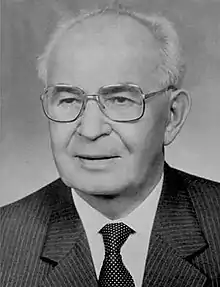 Gustáv Husák | |
| First Secretary of the Communist Party of Czechoslovakia | |
| In office 17 April 1969 – 17 December 1987 | |
| Preceded by | Alexander Dubček |
| Succeeded by | Miloš Jakeš |
| 9th President of Czechoslovakia | |
| In office 29 May 1975 – 10 December 1989 | |
| Preceded by | Ludvík Svoboda |
| Succeeded by | Václav Havel |
| Personal details | |
| Born | 10 January 1913 Pozsonyhidegkút, Pozsony County, Austria-Hungary (now Dúbravka, Bratislava, Slovakia) |
| Died | 18 November 1991 (aged 78) Bratislava, Czechoslovakia (now Slovakia) [1] |
| Political party | Communist Party of Czechoslovakia |
| Spouse(s) | Magda Husáková-Lokvencová (1938-1960 divorced) Viera Husáková-Čáslavská (1975-1977 her death) |
| Alma mater | Comenius University |
| Signature |  |
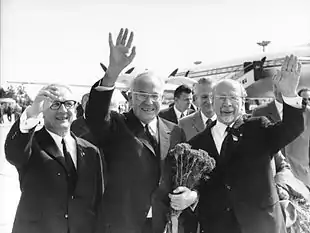
Early life
Gustáv Husák was born as a son of an unemployed worker in Pozsonyhidegkút, Pozsony County, Kingdom of Hungary, Austria-Hungary (now part of Bratislava, Slovakia as Dúbravka). He joined the Communist Youth Union at the age of sixteen while studying at the grammar school in Bratislava. In 1933, when he started his studies at the Law Faculty of the Comenius University in Bratislava, he joined the Communist Party of Czechoslovakia (KSČ) which was banned from 1938 to 1945. During World War II he was periodically jailed by the Jozef Tiso government for illegal Communist activities, and he was one of the leaders of the 1944 Slovak National Uprising against Nazi Germany and Tiso. Husák was a member of the Presidium of the Slovak National Council from 1 September to 5 September 1944.
After the war, he began a career as a government official in Slovakia and party functionary in Czechoslovakia. From 1946 to 1950, he was the head of the devolved administration of Slovakia, and as such he strongly contributed to the liquidation of the anti-communist Christian democratic Democratic Party of Slovakia. That party had taken 62% in the 1946 elections in Slovakia (whereas in the Czech part of the republic, the clear winner were the Communists), thus complicating the Communist ambitions for a swift taking of power. Husák's loyalty to the central organs of the Czechoslovak Communist party as well as his considerable talent for body politics and a ruthless approach to political opponents contributed largely to the crushing of the Democratic dissent in Slovakia and subjugating the popular opinion in the country to the prevailing political currents.
In 1950, he fell victim to a Stalinist purge of the party leadership, and was sentenced to life imprisonment, spending the years from 1954 to 1960 in the Leopoldov Prison. A convinced Communist, he always viewed his imprisonment as a gross misunderstanding, which he periodically stressed in several letters of appeal addressed to the party leadership. It is generally acknowledged that the then party leader and president Antonín Novotný repeatedly declined to pardon Husák, assuring his comrades that "you do not know what he is capable of if he comes to power".
As part of the De-Stalinization period in Czechoslovakia, Husák's conviction was overturned and his party membership restored in 1963. By 1967 he had become a critic of Novotný and the KSČ's neo-Stalinist leadership. In April 1968, during the Prague Spring under new party leader and fellow Slovak Alexander Dubček, Husák became a vice-premier of Czechoslovakia, responsible for overseeing reforms in Slovakia.
Leader of Czechoslovakia
As the Soviet Union grew increasingly alarmed by Dubček's liberal reforms in 1968 (Prague Spring), Husák, originally Dubček's ally and a moderate supporter of the reform programme, began calling for caution. After the Soviets invaded Czechoslovakia in August, Husák participated in the Czechoslovak-Soviet negotiations between the kidnapped Dubček and Leonid Brezhnev in Moscow. Husák changed course and became a leader among those party members calling for the reversal of Dubček's reforms. An account for his pragmatism was given in one of his official speeches in Slovakia after the 1968 events, during which he ventured a rhetorical question, asking where the opponents of the Soviet Union wished to find allies of Czechoslovakia that might come to support the country against Soviet troops.
Supported by Moscow, he was appointed leader of the Communist Party of Slovakia in as early as August 1968, and he succeeded Dubček as first secretary (title changed to general secretary in 1971) of the Communist Party of Czechoslovakia in April 1969. He reversed Dubček's reforms and purged the party of its liberal members in 1969–1971. In 1975, Husák was elected President of Czechoslovakia. During the two decades of Husák's leadership, Czechoslovakia became one of Moscow's most loyal allies.
In the first years following the invasion, Husák managed to appease the outraged civil population by providing a relatively satisfactory living standard and avoiding any overt reprisals like was the case in the 1950s. His regime was not a complete return to the heavy-handed Stalinism that prevailed during the first 20 years of Communist rule in the country. At the same time, the people's rights were somewhat more restricted than was the case in János Kádár's Hungary and Josip Broz Tito's Yugoslavia. Indeed, on the cultural level the level of repression approached that seen in Erich Honecker's East Germany and even Nicolae Ceauşescu's Romania. There was a campaign of repression by the secret police (StB) targeting dissidents represented later by Charter 77 as well as hundreds of unknown individuals who happened to be targets of the StB's pre-emptive strikes. The repression intensified over the years as Husák grew more conservative.
Starting in the early 1970s, Husák allowed those who had been purged in the aftermath of Prague Spring to rejoin the party. However, they were required to publicly distance themselves from their past actions.
The latter part of Husák's tenure saw a struggle within the Politburo over whether to adopt Gorbachev-style reforms. While the hardliners, led by Vasiľ Biľak, opposed any restructuring, moderates led by Prime Minister Lubomir Strougal strongly favoured reform. Husák himself stayed neutral until April 1987, when he announced a somewhat half-hearted reform program scheduled to start in 1991.
Later that year, however, Husák yielded his post as general secretary to Miloš Jakeš in response to a desire for younger leaders (Jakeš and Ladislav Adamec) to share in power.
On November 24, 1989, the entire Presidum of the Communist Party, including Husák, resigned in the wake of the Velvet Revolution. The party officially abandoned power four days later. On 10 December, Husák swore in a new government. Although it was headed by a Communist, Marián Čalfa, it had a non-Communist majority–the first in 41 years that was not dominated by Communists and/or fellow travelers. He resigned later that day, just hours after presiding over the formal end of the regime he had largely created. In a desperate attempt to rehabilitate its image ahead of the first free elections in 44 years, the Communist Party expelled him in February 1990. He died, almost forgotten, on 18 November 1991, at the age of 78.
.jpg.webp)
There is still some question about Husák's moral responsibility for the last two decades of Communist rule in Czechoslovakia. After its collapse, Husák kept saying that he was just trying to diminish the aftermath of the Soviet invasion and had to constantly resist pressure from hard line Stalinists in the party such as Biľak, Alois Indra and the like. It is true that in the early 1970s, he personally pushed for an early withdrawal of the Soviet troops from Czechoslovak territory, which did not happen until 1991; this may be ascribed to his pragmatic attempts to ease the situation and to give an impression that things were leaning toward "normality".
However, there are many irrefutable facts convicting him of a great deal of personal contribution to the regime's nature. As the General Secretary of the Party, he was well able and willing to control the repressive state apparatus. There are many documented cases of appeals from politically persecuted persons, but almost none of them was given Husák's attention. As the overall decay of Czechoslovak society was becoming more and more obvious in the 1980s, Husák became a politically impotent puppet of events.
Gustáv Husák was awarded the title Hero of the Czechoslovak Socialist Republic 3 times, in 1969, 1973, 1982. In 1983 he was awarded the title of Hero of the Soviets Union.[4]
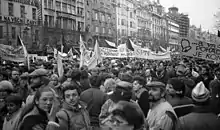
Husák allegedly confessed to a Catholic priest before his death, having previously been an atheist.[5] On his deathbed in 1991, Husák then supposedly received the sacrament of reconciliation from a Catholic archbishop, Ján Sokol.[6][7] However, Chapter 7.2.1 in the book Michal Macháček: Gustáv Husák, Vyšehrad, 2017,[8] states the whole story of confession is pure nonsense and the product of catholic propaganda.
Awards and Honors
 Czechoslovakia:
Czechoslovakia:
 Hero of the Czechoslovak Socialist Republic, thrice (1969, 1972, 1982)
Hero of the Czechoslovak Socialist Republic, thrice (1969, 1972, 1982) Order of Klement Gottwald, four times
Order of Klement Gottwald, four times Order of Victorious February
Order of Victorious February
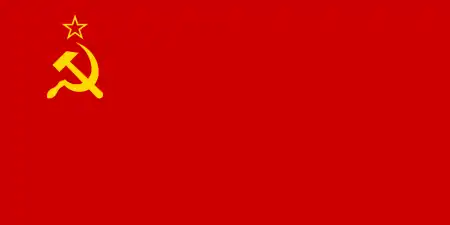 Soviet Union:
Soviet Union:
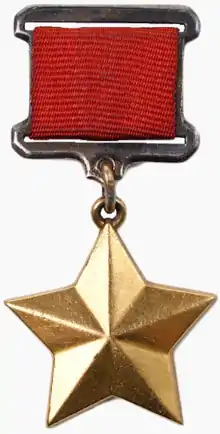 Hero of the Soviet Union (1983)
Hero of the Soviet Union (1983) Orders of Lenin, four times (1969, 1973, 1983, 1988)
Orders of Lenin, four times (1969, 1973, 1983, 1988) Order of the October Revolution (1978)
Order of the October Revolution (1978) Jubilee Medal "In Commemoration of the 100th Anniversary of the Birth of Vladimir Ilyich Lenin" (1969)
Jubilee Medal "In Commemoration of the 100th Anniversary of the Birth of Vladimir Ilyich Lenin" (1969)
- Other countries:
 Grand Cross of the Order of May (Argentina)
Grand Cross of the Order of May (Argentina) Order of Georgi Dimitrov, twice (Bulgaria)
Order of Georgi Dimitrov, twice (Bulgaria) Order of Stara Planina (Bulgaria)
Order of Stara Planina (Bulgaria) Order of Jose Marti (Cuba)
Order of Jose Marti (Cuba).png.webp) Order of Playa Girón (Cuba)
Order of Playa Girón (Cuba) Order of Karl Marx, twice (East Germany)
Order of Karl Marx, twice (East Germany) Grand Cross of the White Rose of Finland (Finland)
Grand Cross of the White Rose of Finland (Finland) Order of the Flag of the Republic of Hungary (Hungary)
Order of the Flag of the Republic of Hungary (Hungary) Order of Pahlavi (Iran)
Order of Pahlavi (Iran) Order of Sukhbaatar, thrice (Mongolia)
Order of Sukhbaatar, thrice (Mongolia) Order of the National Flag 1st class, twice (North Korea)
Order of the National Flag 1st class, twice (North Korea) Order of the Grand Cross of the Rebirth of Poland (Poland)
Order of the Grand Cross of the Rebirth of Poland (Poland) Order of the Star of the Romanian Socialist Republic 1st class (Romania)
Order of the Star of the Romanian Socialist Republic 1st class (Romania) Order of Victory of Socialism (Romania)
Order of Victory of Socialism (Romania) Order of Civil Merit (Syria)
Order of Civil Merit (Syria)
Functions
Communist Party of Czechoslovakia/KSČ (prohibited 1938, dissolved 1939-1945)
- 1933-1938/1939 and 1989(December)-(February)1990: common member
- spring 1945: member of its Provisional Central Committee (established in the parts of Czechoslovakia liberated by the Red Army)
- 1949-1951 and 1968 (31 August)-1989: member of its Central Committee
- 1968 (31 August)-1989 (24 November): member of its Presidium
- 1969 (April) -1987 (December): one of its secretaries
- 1969 (April)-1987: party leader (First Secretary, since 1971 Secretary General of the Central Committee of the Communist Party of Czechoslovakia)
- 1987 (17 December): resigned as party leader (replaced by Miloš Jakeš)
Communist Party of Slovakia/KSS (illegal 1939-1944/1945)
- 1939-1945: one of its leaders
- 1943-1944: member of its 5th illegal Central Committee
- 1944-1950 and 1968 -1971: member of its Central Committee and (except for 1970–1971) member of its Presidium and (except for 1944–1948) one of its secretaries
- 1944-1945: vice-chairman
- 1968 (28 August)-1969: party leader ("first secretary")
Slovak National Council (Slovenská národná rada) (during World War II a resistance parliament-government, since 1968 the Slovak parliament)
- 1943-1944: one of its main organizers
- 1944-1950 and 1968 (December)-1971: its deputy
- 1944-1950: member of its Presidium
- 1944-1945: vice-chairman
Council of Commissioners (Zbor povereníkov) (a quasi government responsible for Slovakia)
- 1944-1945: Commissioner of the Interior
- 1945-1946: Commissioner of Transport and Technology in Slovakia
- 1946-1950: President of the Council of Commissioners, in which he contributed to the suppression of the influential Democratic Party of Slovakia by the Communists (1947–1948)
- 1948-1950: Commissioner of Agriculture and Land Reform in Slovakia
- 1949-1950: Commissioner of Alimentation in Slovakia
Czechoslovak Parliament (called National Assembly and since 1968 Federal Assembly)
- 1945-1951 and 1968-1975: deputy
- 1969-1975: member of its Presidium
Czechoslovak government
- 1968 (April–December): a vice-premier of the Prague Spring Czechoslovak government
President of Czechoslovakia
- 1975-1989: President of Czechoslovakia
- 1989 (10 December): resigned as the President of Czechoslovakia within the Velvet Revolution
Other important data
- 1929-1932: member of the Communist Youth Union (prohibited in 1932)
- 1933-1937: studies at the Law Faculty of the Comenius University in Bratislava,
- 1938 received a title Dr. (of law) and started to work as a lawyer in Bratislava
- 1936-1938: member of the Slovak Youth Union (1936 founder and secretary)
- 1937-1938 vice-president of the Slovak Students Union and secretary of the Association for the Economic and Cultural Cooperation with the Soviet Union
- 1940-1944: four times shortly jailed by the government of Jozef Tiso for illegal Communist activities
- 1943-1944: member of the 5th illegal KSS Central Committee, one of the main organizers of the anti-Nazi Slovak National Uprising (1944) and of its leading body, the Slovak National Council
- late 1944- February 1945: he fled to Moscow after the defeat of the Slovak National Uprising
- 1950: charged with "bourgeois nationalism" with respect to Slovakia (see History of Czechoslovakia)
- 1951: arrested
- 1954: sentenced to life imprisonment
- 1954-1960: imprisoned
- 1960: conditionally released through an amnesty
- 1963: his conviction was overturned and his party membership restored and he was rehabilitated
- 1963-1968: scientific employee of the State and Law Institute of the Slovak Academy of Sciences
- 1969 (April)-1987 (December): chief commander of the Popular Militia
- 1971 (January)-1987 (December): president and member of the Presidium of the National Front Central Committee
See also
| Wikimedia Commons has media related to Gustáv Husák. |
References
- https://www.nytimes.com/1991/11/19/world/gustav-husak-czechoslovak-leader-dies-at-78.html
- "Husák, Gustáv". Lexico UK Dictionary. Oxford University Press. Retrieved 31 July 2019.
- "Husák". Merriam-Webster Dictionary. Retrieved 31 July 2019.
- (in Russian) Biography at the website on Heroes of the Soviet Union and Russia
- "When Christianity becomes a crime". Catholic Herald. June 9, 2016.
- "Former Soviet boss Gorbachev denies conversion to Christianity". April 4, 2008.
- "EX-CZECH LEADER GUSTAV HUSAK DIES - The Washington Post".
- Fresh Services, s r o. "Gustáv Husák | iVyšehrad.cz". www.ivysehrad.cz.
Literature
- MACHÁČEK, Michal. Gustáv Husák. Prague : Vyšehrad 2017, 632 pp. ISBN 978-80-7429-388-7.
- MACHÁČEK, Michal. The Strange Unity. Gustáv Husák and Power and Political Fights Inside the Communist Party of Czechoslovakia as Exemplified by Presidency Issue (1969-1975), in: Czech Journal of Contemporary History, 2016, vol. 4, 104–128 pp. .
External links
Speeches and Writings, a publication from 1986.
| Political offices | ||
|---|---|---|
| Preceded by Ludvík Svoboda |
President of Czechoslovakia 29 May 1975–10 December 1989 |
Succeeded by Václav Havel |
| Party political offices | ||
| Preceded by Alexander Dubček |
First Secretary of the Communist Party of Czechoslovakia 17 April 1969–17 December 1987 |
Succeeded by Miloš Jakeš |